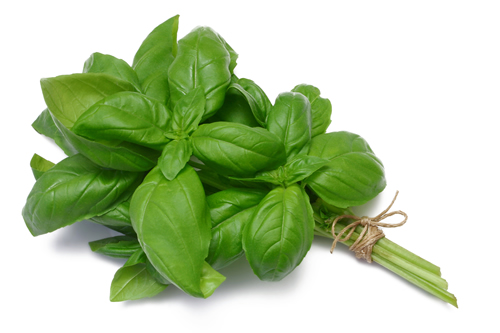Basil

Basil is used for stomach spasms, loss of appetite, intestinal gas, kidney conditions, fluid retention, head colds, warts, and worm infections. It is also used to treat snake and insect bites.
Women sometimes use basil before and after childbirth to promote blood circulation, and also to start the flow of breast milk.
Some people use it as a gargle.
Special Precautions & Warnings:
Pregnancy and breast-feeding: Basil is LIKELY SAFE for pregnant and breast-feeding women in food amounts. But larger medicinal amounts are POSSIBLY UNSAFE. Basil contains a chemical, estragole, which has caused liver cancer in laboratory mice.
Children: Basil is LIKELY SAFE for children in food amounts. But larger medicinal amounts are POSSIBLY UNSAFE. Basil contains a chemical, estragole, which has caused liver cancer in laboratory mice.
Bleeding disorders: Basil oils and extracts might slow blood clotting and increase bleeding. In theory, basil oils and extracts might make bleeding disorders worse.
Low blood pressure: Basil extracts might lower blood pressure. In theory, taking basil extracts might make blood pressure become too low in people with low blood pressure.
Surgery: Basil oils and extracts might slow blood clotting. In theory, basil oils or extracts might increase the risk for bleeding during surgical procedures. Stop using basil at least 2 weeks before a scheduled surgery.
Historical Use
The plant is devoted to the Hindu gods Krishna and Vishnu and can often be found cultivated around the temples where those gods are worshipped.
It is said that sweet basil was found growing around Jesus’ tomb after the resurrection, and the Greek Orthodox Church uses it in the holy water. In Greece, it is quite common to see the herb planted in front of houses since it is believed to bring good luck. In Western Europe, during the Middle Ages, it was considered the devil’s herb and used in potions to protect against witches.
The herb was and still is used extensively in Ayurvedic (Indian) medicine for its antiseptic properties. Sweet basil is also used medically in China, mainly to promote good blood circulation after birth, and to treat kidney problems and stomach cramps
It has been used traditionally to alleviate and treat flatulence, abdominal cramps, colic, constipation, and indigestion. It can also be used to prevent nausea and vomiting, and to rid the body of intestinal worms.
Basil has a mild soothing and sedative effect that could make it useful in the treatment of nervous irritability, depression, anxiety and sleep difficulties.
Sweet basil may lower sugar values in both blood and urine. A 62-patients study, which was published in 1997, showed that consumption of basil reduced the amount of glucose by 17 percent compared with a control group that received a placebo. The amount of cholesterol and sugar in the urine were also reduced, but not significantly.
More and larger studies are needed to determine whether basil may have a value as a glucose-lowering agent for diabetes patients.
The fresh leaves have been used as an insect repellant and the juice extracted from the leaves is used to treat snake bites and insect stings.
Used as a tea or a mouth rinse mixed with water, the herb can be used as an herbal remedy to relieve cough, whooping cough and sore throat, and fresh leaves can be chewed for fresher breath or to get rid of bad breath.
The leaves have been used to remove warts and other skin blemishes. The herb contains many viral inhibitory substances, which explains this traditional use.
In many cultures, basil is regarded as a herb to promote menstruation, induce labor and as an aphrodisiac, but no evidence exists to substantiate this use.
Preparation and Dosage
As a tea – 2 tablespoons of fresh ground leaves to one cup of boiling water. Steep for 15 minutes and then strain. Drink 1 to 2 cups daily.
Attributes
Cleansing, protection, love, wealth (if carried in wallet), healing relationships, ensuring faithfulness in a mate, courage, fertility, exorcism, luck.
SOURCES